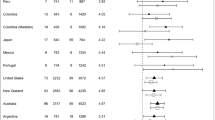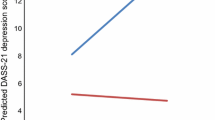Abstract
Background
Several large surveys have suggested high prevalence of psychiatric disorders among gay men and other men who have sex with men.
Methods
In 2002, a comprehensive health survey was conducted among 571 gay men in Geneva, Switzerland, using probability-based time-space sampling. The Composite International Diagnostic Interview Short-Form (CIDI-SF) was used to assess 12-month prevalence of major depression, specific phobia, social phobia, alcohol dependence, and drug dependence.
Results
Nearly half (43.7%, 95% CI=39.0–48.4) of the sample fulfilled the criteria for at least one of the five DSM-IV disorders: 19.2% had major depression, 21.9% had specific and/or social phobia, and 16.7% had an alcohol and/or drug dependence disorder in the past 12 months. Over one quarter of the cases were comorbid with another kind of disorder, and 35.7% of cases consulted a health care professional in the past 12 months for mental health. Like cases, screen-positives for mood and/or anxiety disorders (24.7%) also reported significantly greater disability and lower quality of life.
Conclusions
Nearly two-thirds of this community sample of gay men was affected by psychiatric morbidity with new evidence for comorbidity, subthreshold disorders, and low levels of awareness of psychiatric disorders and their treatment. This population needs to be a priority in psychiatric epidemiology and mental public health.

Similar content being viewed by others
References
Andrews G, Henderson S, Hall W (2001) Prevalence, comorbidity, disability and service utilisation: overview of the Australian National Mental Health Survey. Br J Psychiatry 178:145–153
Aube J, Koestner R (1992) Gender characteristics and adjustment: a longitudinal study. J Pers Soc Psychol 63:485–493
de Bruin A, Picavet HSJ, Nossikov A (eds) (1996) Health interview surveys: Towards international harmonization of methods and instruments. WHO regional publications, European series No. 58. Copenhagen, World Health Organization Regional Office for Europe
Ciesla JA, Roberts JE (2001) Meta-analysis of the relationship between HIV infection and risk for depressive disorders. Am J Psychiatry 158:725–730
Cochran S (2001) Emerging issues in research on lesbians’ and gay men’s mental health: does sexual orientation really matter? Am Psychol 56:932–947
Cochran SD, Mays VM (2000) Relation between psychiatric syndromes and behaviorally defined sexual orientation in a sample of the US population. Am J Epidemiol 151:516–523
Cochran SD, Sullivan JG, Mays VM (2003) Prevalence of mental disorders, psychological distress, and mental health services use among lesbian, gay, and bisexual adults in the United States. J Consult Clin Psychol 71:53–61
D’Augelli AR, Grossman AH, Starks MT (2006) Childhood gender atypicality, victimization, and PTSD among lesbian, gay, and bisexual youth. J Interpers Violence 21:1462–1482
Egan SK, Perry DG (2001) Gender identity: a multidimensional analysis with implications for psychosocial adjustment. Dev Psychol 37:451–463
Fagot BI (1977) Consequences of moderate cross-gender behavior in preschool children. Child Dev 48:902–907
Fergusson DM, Horwood LJ, Beautrais AL (1999) Is sexual orientation related to mental health problems and suicidality in young people? Arch Gen Psychiatry 56:876–880
Gilman SE, Cochran SD, Mays VM, Hughes M, Ostrow D, Kessler RC (2001) Prevalences of DSM-III-R disorders among individuals reporting same-gender sexual partners in the National Comorbidity Survey. Am J Public Health 91:933–939
de Girolamo G, Bassi M (2003) Community surveys of mental disorders: recent achievements and works in progress. Curr Opin Psychiatry 16:403–411
Jacobi F, Wittchen H-U, Hölting C, Höfler M, Pfister H, Müller N, Lieb R (2004) Prevalence, co-morbidity and correlates of mental disorders in the general population: results from the German Health Interview and Examination Survey (GHS). Psychol Med 34:597–611
Kessler RC, Andrews G, Mroczek D, Ustun B, Wittchen H-U (1998) The World Health Organization Composite International Diagnostic Interview Short-Form (CIDI-SF). Int J Methods Psychiatr Res 7:171–185
MacKellar D, Valleroy L, Karon J, Lemp G, Janssen R (1996) The Young Men’s Survey: methods for estimating HIV prevalence and risk factors among young men who have sex with men. Public Health Rep 111(Suppl):138–144
Mays VM, Cochran SD (2001) Mental health correlates of perceived discrimination among lesbian, gay, and bisexual adults in the United States. Am J Public Health 91:1869–1876
Meyer IH (2003) Prejudice, social stress, and mental health in lesbian, gay, and bisexual populations: conceptual issues and research evidence. Psychol Bull 129:674–697
Mills TC, Paul J, Stall R, Pollack L, Canchola J, Chang YJ, Moskowitz JT, Catania JA (2004) Distress and depression in men who have sex with men: the Urban Men’s Health Study. Am J Psychiatry 161:278–285
Nosikov A, Gudex C (2003) EUROHIS: Developing Common Instruments for Health Surveys. IOS Press, Amsterdam
Pollack LM, Osmond DH, Paul JP, Catania JA (2005) Evaluation of the Center for Disease Control and Prevention’s HIV Behavioral Surveillance for men who have sex with men: sampling issues. Sex Transm Dis 32:581–589
Sandfort TGM, de Graaf R, Bijl RV, Schnabel P (2001) Same-sex sexual behavior and psychiatric disorders: findings from the Netherlands Mental Health Survey and Incidence Study (NEMESIS). Arch Gen Psychiatry 58:85–91
Stall R, Mills TC, Williamson J, Hart T, Greenwood G, Paul J, Pollack L, Binson D, Osmond D, Catania JA (2003) Association of co-occurring psychosocial health problems and increased vulnerability to HIV/AIDS among urban men who have sex with men. Am J Public Health 93:939–942
Stueve A, O’Donnell LN, Duran R, San Doval A, Blome J (2001) Time-space sampling in minority communities: results with young Latino men who have sex with men. Am J Public Health 91:922–926
The ESEMeD/MHEDEA 2000 Investigators (2004) Use of mental health services in Europe: results from the European Study of the Epidemiology of Mental Disorders (ESEMeD) project. Acta Psychiatr Scand 109(Suppl. 420):47–54
The ESEMeD/MHEDEA 2000 Investigators (2004) Prevalence of mental disorders in Europe: results from the European Study of the Epidemiology of Mental Disorders (ESEMeD) project. Acta Psychiatr Scand 109(Suppl. 420):28–37
The ESEMeD/MHEDEA 2000 Investigators (2004) 12-month comorbidity patterns and associated factors in Europe: results from the European Study of the Epidemiology of Mental Disorders (ESEMeD) project. Acta Psychiatr Scand 109(Suppl. 420):21–27
WHO International Consortium in Psychiatric Epidemiology (2000) Cross-national comparisons of the prevalences and correlates of mental disorders. Bull World Health Organ 78:413–426
Wang J, Häusermann M, Vounatsou P, Aggleton P, Weiss MG (2007) Health status, behavior, and care utilization in the Geneva Gay Men’s Health Survey. Prev Med 44:70–75
Acknowledgements
The authors wish to thank project assistant Vincent Jobin and the many volunteers and experts in Geneva who have contributed to the overall project. Special acknowledgement goes to Ron Clarke at Health Canada for his participation in discussions on the overall project and Dr. Ron de Graaf at the Netherlands Institute of Mental Health and Addiction (or Trimbos Institute) for his valuable input on the subject of mental health. Dialogai is a non-profit organisation supported by a grant from the canton of Geneva. The data collection for the Geneva Gay Men’s Health Survey was financed by the Swiss National Research Foundation grant 3326-062448 and the Swiss Federal Office of Public Health. This publication and the analyses therein were financed by the Swiss National Research Foundation grant 3346C0-104189.
Author information
Authors and Affiliations
Corresponding author
Rights and permissions
About this article
Cite this article
Wang, J., Häusermann, M., Ajdacic-Gross, V. et al. High prevalence of mental disorders and comorbidity in the Geneva Gay Men’s Health Study. Soc Psychiat Epidemiol 42, 414–420 (2007). https://doi.org/10.1007/s00127-007-0190-3
Accepted:
Published:
Issue Date:
DOI: https://doi.org/10.1007/s00127-007-0190-3




